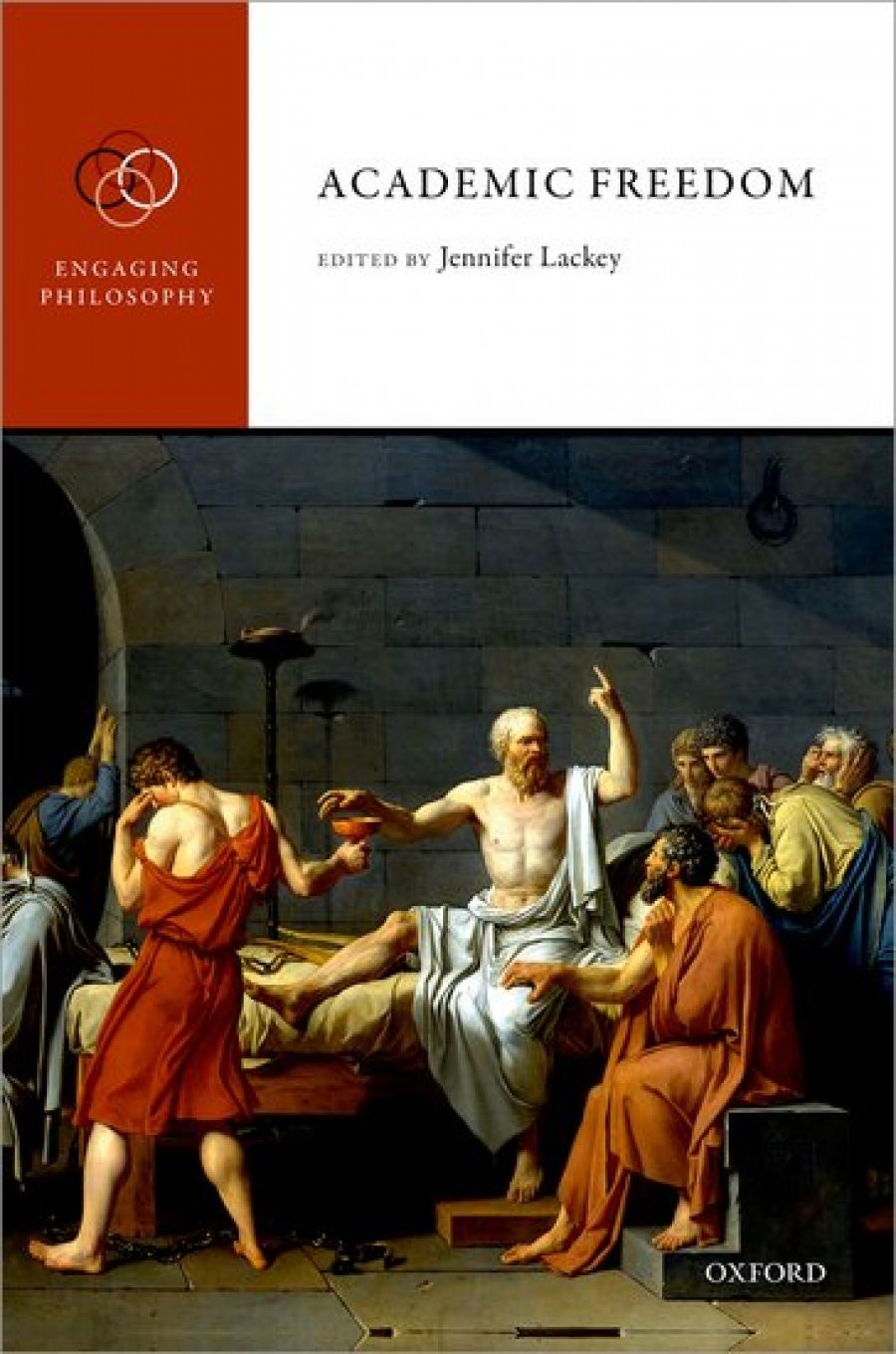
- Free Article: No
- Contents Category: Philosophy
- Custom Article Title: Ronan McDonald reviews 'Academic Freedom' edited by Jennifer Lackey
- Review Article: Yes
- Book 1 Title: Academic Freedom
- Book 1 Biblio: Oxford University Press, $102.99 hb, 222 pp, 9780198791508
Academic freedom is here defined by Jennifer Lackey as those norms by which ‘members of institutions of higher learning engage in intellectual pursuits without fear of censorship or retaliation’. But why should those norms prevail? The traditional rationale, most famously expressed by John Stuart Mill, holds that truth is best found through the unfettered play and frequent collision of ideas and perspectives. We are fallible creatures, bound by time and place. What is shocking and subversive for one historical moment (the idea that the earth is not the centre of the universe, or that we have evolved through natural selection) will be accepted wisdom for the next. Who is to say which of today’s heterodoxies will be orthodox tomorrow? For Mill, we should not only tolerate objectionable speech, we should embrace it. It will, at the least, strengthen our convictions by forcing us to defend them.
The campus left’s weakening belief in free speech is of a piece with its truth scepticism, its Foucauldian inclination to consider talk of objective reality as obscuring sectional interests. Without a firm belief that truth exists and is discoverable, why defend its pursuit through the inevitably painful disagreements occasioned by free enquiry? The contemporary humanities and social sciences tend to regard truth less as a matter of disinterested investigation than of power games and contesting discourses. Truth scepticism is peddled not only by the French postmodernists and Foucauldian radicals but also by a strong tradition of American pragmatism, exemplified by the late Richard Rorty. Michael P. Lynch’s opening essay affords stimulating new arguments for a reclamation of truth-based or epistemic justifications for academic freedom aligned with justice and the social good. The case for a minimally censored and cosseted university environment is powerfully argued by Michele Moody-Adams in ‘Is There a “Safe Space” for Academic Freedom?’, the first of several essays that grapple with the idea of ‘harm’. She is more cautionary about safe spaces, trigger warnings, and changing buildings names than some later contributors. She queries the ideology of ‘insidious trauma’, which encourages students to believe that ‘you’re nobody until somebody wounds you’ and urges that education often means intellectual discomfort. Helping them feel always ‘at home’, as opposed to welcome, may do students graver harm than challenging them with offensive ideas.
Where does academic freedom begin and end? When a head of department requires a faculty member to give a fair share of lectures, it is hardly the ‘compelled speech’ of a tyranny. Equally, when a professor calls on students to quieten down at the beginning of class, she is not ‘silencing’ them in the pernicious sense. Not all academic silencing is equal. Mary Kate McGowan argues that the silence of a conservative student who wants to argue in favour of the death penalty but fears that her views will be badly received is different in kind to an Asian man who falls silent because the professor and his classmates repeatedly confuse him with the other Asian in the class (a micro-aggression). Jennifer Saul persuasively maintains that the main threat to academic freedom is the precarious employment conditions of adjunct lecturers, rather than fragile students. Pettit’s essay distinguishes between ‘unhindered speech’ and the ‘protected speech’ that he favours. Speech is only really free if it is mediated through institutions, such as those which afford academic freedom. As John Locke pithily puts it, ‘where there is no law, there is no freedom’.
Most of these essays are marked with the calm focus and clarity of the best philosophical writing in the Anglo-American tradition. They emolliate an often livid debate. Some are outstanding. Yet the collection feels constricted, both geographically and in disciplinary terms. The emphasis is relentlessly American. Strangely enough for Oxford University Press, not even the United Kingdom gets a look in, let alone Hungary and China. The question of academic autonomy is also eschewed, an issue central in Australia to the Ramsay Centre controversy. What are the claims of institutional autonomy against donor interference or government control? A historian of ideas could have provided a genealogy of academic freedom within the university as an institution. A cultural theorist may have enlightened us on whence the new ‘wokeness’ has arisen. A sociologist may have enlightened us on the group dynamics of the current debates. Yet to leave a book hungry for other perspectives is a salutary sign, and I do so with a confident recommendation: those interested in the role of the modern university should read this book.


Comments powered by CComment